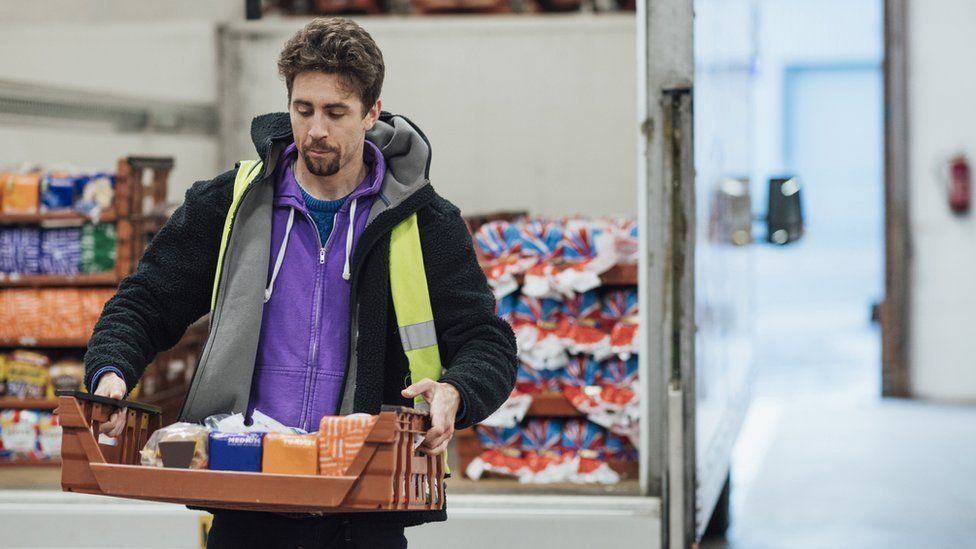
Supermarket depot workers and food manufacturers will be exempt from quarantine rules as the government tries to prevent food supply problems.
The move comes after the rising number of retail workers being forced to self-isolate began to affect the availability of some products.
The government said workers, regardless of vaccination status, could do daily Covid testing instead of isolating.
Up to 10,000 workers are expected to qualify for the scheme.
The new daily contact testing measures are beginning at 15 supermarket depots, followed by 150 depots next week, but they will not apply to supermarket store staff.
Environment Secretary George Eustice told BBC Breakfast that shop staff had been excluded from the scheme because their inclusion would have been a “really significant undertaking”.
“You’re talking then thousands of different shops and many more people and we still want to maintain the test, trace and isolate system.”
However, he added that the government would keep the policy “under review, but we think this is a sensible first step”.
“We’re never going to take risks with our food supply chain,” he added.
The government’s move comes as supermarkets said the supply of some products was being affected by the “pingdemic” keeping staff away from work.
A record 618,903 people were told to self-isolate by the NHS Covid app between 8 and 15 July.in England and Wales.

While some retailers said they may have to close stores, they played down fears of food shortages, saying the problems were not widespread.
It will mean workers who are alerted by the app or contacted by NHS Test and Trace will be able to continue working if they test negative, whether or not they are vaccinated.
Helen Dickinson, chief executive of the British Retail Consortium, said “disruption is limited at the moment”, but it was vital that the government rolled out the scheme as fast as possible and was prepared to take further action if necessary.
Separately, the government outlined plans to allow other key industries in England to deploy daily Covid testing instead of self-isolation for a limited number of essential workers. In this case, the scheme will only apply to workers who are fully vaccinated.
This scheme covers sectors including transport, emergency services, border control, energy, digital infrastructure, waste, the water industry, essential defence outputs and local government.
The policy applies only to workers named on a list kept updated by officials – it is not a blanket exemption for all employees in a sector.
‘Shoppers should feel reassured’

This intervention should alleviate genuine concerns in the food industry about supplies. Hundreds of designated sites – supermarket depots and food manufacturers – will be able to administer the tests that will enable workers to skip the need for self-isolation.
This will be the case whatever the vaccination status of the worker. It is not sector-wide and will not, for example, apply to actual supermarket stores.
But it should be enough to stop some of the sporadic shortages become a systemic issue. Shoppers should feel reassured.
More generally, the help in other sectors is limited.
The government clarified that the scheme announced earlier this week to allow named double-vaccinated workers approved by letter to avoid isolation would apply to 16 sectors, from energy to waste to medicine and essential transport.
The bar is high. The government is trying to keep the Test and Trace system intact as a second line of defence against the pandemic. It is as tricky a balancing act as it has always been.
Hannah Essex, co-executive director of the British Chambers of Commerce, said that while the announcement would be a relief to some businesses, “it will leave many more still facing critical staff shortages and lost revenue as the number of people being asked to isolate remains high”.
CBI director general Tony Danker agreed, warning: “The current approach to self-isolation is closing down the economy, rather than opening it up.”
Businesses have already exhausted contingency plans to get in extra staff and are “at risk of grinding to a halt in the next few weeks”, he added.
Phil Langslow, trading director at Cheshire-based County Milk Products, which provides dairy products to the likes of Nestle and Kellogg’s, said the government move was “a step in the right direction“.
“People having to isolate meant that a number of our suppliers, the service providers that are doing the transport for us, have just said they cannot cope. Roughly half of the deliveries that we would expect to be done are not being done routinely and we’re having to scramble to actually get product to its destination on time.
“If you think of the food chain as just that – as a chain, and like any chain, you’re only as good as the weakest link – if you cannot get your goods to the market, then you’ve got a problem,” he told the BBC’s Today programme.
Scotland has also launched a system of exemptions from self-isolation, covering workers in sectors such as health and social care.
Health Secretary Sajid Javid said daily testing of food industry staff would “minimise the disruption caused by rising cases in the coming weeks, while ensuring workers are not put at risk”.
Source” bbc news























